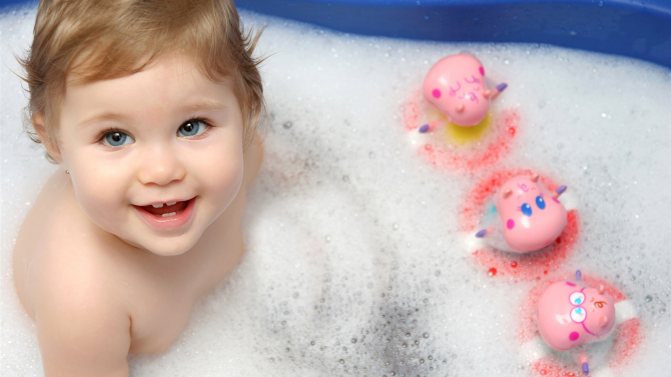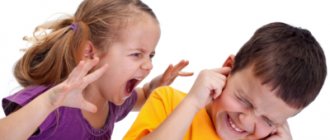How to overcome a child's fears?
Firstly , you need to analyze and understand what exactly your baby is afraid of. Surely he doesn’t like one thing in the bathing procedure, and not the entire process.
Secondly , eliminate what prevents the child from taking a bath calmly.
Here are, for example, hint options:
- The child does not like the temperature of the water. Mom makes the water too hot to prevent the baby from catching a cold. First make the water 37 degrees, and then slowly add hotter water. If you want to harden your child, carry out all procedures gradually.
- The child does not like to be washed in the shower. If it’s hard to do without a shower, take water into any suitable vessel and water your baby - he may like this procedure more.
- The baby doesn't like water getting on his face. Here, just try to wash your child so that nothing gets on his face, and keep a towel handy just in case. Wash your face a little before or after a bath.
- The child does not like being washed with a washcloth. Most likely, the baby does not like “this” washcloth - replace it with a softer one. It is better to wash yourself several times without using a washcloth at all.
- The child generally does not like being washed, but enjoys playing in the water himself. In this case, you need to give the child free rein - let him wash for a while by playing in the water. And little by little, while your baby is splashing, begin to wash him discreetly.
When bathing a baby, it is better to eliminate or replace all possible inconveniences. Try to change the bathroom environment to something more interesting (unfamiliar). Throw toys into the water, buy your baby a new boat, duck or other toy suitable for water.
Swimming while playing
Get him interested in playing in the water and distract him as much as possible from the washing procedure. Take care of your baby's safety in the bathroom and do not leave him unattended!
Children who don't like to take baths often enjoy splashing around in an inflatable pool, lake or sea. This serves as proof that the baby does not “dislike water,” he simply does not like something about the bathing procedure. Play in the bath!
You can start washing the dishes together as a game, and then move this activity to the bathroom and wash the children's dishes there. Perhaps a successful solution will be when the baby is bathed by the father for some time, and not by the mother.
If the child is still very wary and shy in the water, don’t force him. Just sit your child in the bath and take him out immediately at the first sign of anxiety. Over time, the baby will become more and more calm and will be able to spend a long time in the water. Encourage any interest your baby may have in bathing.
How to deal with your fear of water
When choosing a method of dealing with a phobia, parents should take into account the age of the child and try to find out where the fear came from. Use different methods to achieve a positive result.
Read also…. How to strengthen the immunity of a frequently ill child and after colds
Advice from psychologists
For children of any age, the psycho-emotional atmosphere in the home and relationships with parents are very important. Warmth and understanding help to overcome fears and prevent their occurrence. To get rid of hydrophobia, follow a few tips from psychotherapists and pediatricians.
What not to do if a child is afraid or does not like to swim
- Force you to take a bath, enter a river, a swimming pool, or the sea.
- Yelling while bathing or washing.
- Hurry.
- Immerse your body in water abruptly.
- Accustom to hardening immediately in cold water.
- Leave him alone to swim in a pond.
- Draw a full bath.
- Scare the baby with a shower or strong pressure.
- Splash water in the face, especially for children from birth to one year.
- Carry the child into a cold room after a warm bath.
- Rub the clean body with a hard towel.
- Use rough washcloths.
How to help your baby cope with hydrophobia
- Show by your own example that water is a source of joy, fun, and purity. Teach your baby to love bathing. While washing, talk about how a person cannot exist without water, play, splash. Add more positive emotions to the process.
- Play with water in your free time. Place the basin on the floor, put cups and rubber toys in it. Let the child splash and douse himself. This way he will understand that the water is safe.
- Turn bath time into a game. Bring more toys, ducks, boats. Wash your baby gradually while he is busy.
- Try changing your baby's bathtub. Perhaps the container is too deep, large or, conversely, too tight for the baby.
- Before washing, tell your child what you will do now. Set your baby in a positive mood.
- Be sure to praise after a successful bath. Positive assessment and parental support are very important for children.
- Talk to children 2–3 years old about the need for hygiene procedures and their safety.
- Don't insist on washing if your little one is in a pose today. Skip the hygiene procedure, take a 2-3 day break.
- Wash your child in his pajamas if he doesn't want to do it naked. Get rid of clothes gradually next time. You can remove one item every day for a week.
- Take a swimming course with your babies. The instructor will teach the child to swim and allow him to dive. The baby will see other children and their reaction to water.
- Change the environment, room. Go to your grandmothers and friends on a bath day. Perhaps the reason lies in a negative attitude towards your bathroom. As a last resort, you can wash yourself in a basin in the kitchen.
- Do not bathe a fearful baby in a bad mood, choose the right moment and gently carry out the procedure.
- Wash your babies together. The child will feel safe, and wallowing with dad or mom is much more fun.
- When washing newborns, lean over the bathtub as deeply as possible. The baby will think that you are in the water with him. The neck and head must be clearly held in the air.
- Touch the water before immersing yourself in the bath. Let the baby wet his palm, then his arm to the elbow, his heel, and so on. Stop at the stage when the baby becomes scared.
- Replace washing in a container with a shower or dousing.
- Allow them to do things when bathing that are usually prohibited. For example, drawing on the walls. Gouache and watercolor can be easily erased from the tile, and the child will receive a lot of pleasant emotions.
- Add affection and love to your voice. The baby will feel your care and tenderness. Persuade him to wash only with this intonation, forget about shouting and threats.
- Talk to your baby while he is washing himself. The baby will take his mind off the water and enjoy communicating with his mother.
Important! If fear turns into a phobia, and any contact with water cannot be avoided without hysterics, do not hesitate to consult a doctor, preferably a psychologist or psychotherapist. Early treatment of fear and timely consultation will save the child from problems in the future.
Here are some more interesting tips from a child psychologist on what to do if your child doesn’t like to swim:
Advice from experienced parents
- For 4-6 month old babies, buy a special bathing ring. It is put on the neck, the child feels calm and free. And mom’s hands are not busy.
- Don't skimp on a slide or a seat for bathing children after 6 months. They will protect the bathing process; the baby will not be able to swallow water, roll over, or slip.
- To prevent injuries, place rugs on the floor and in the bathtub.
- Use dry bathing. Play with a bath without water. Cover the bottom with a diaper, put the baby there or sit an older child. Let him get used to the new subject. Gradually add water to it.
- Place your baby in the bath before the water fills. Let him watch the container fill. Give your child toys. While the water fills up, he will play out and forget that he was afraid.
- Use special shampoos and shower gels labeled “No Tears.” They are easy to wash out of the hair, they do not irritate, and do not pinch the mucous membrane.
- There is no need to soap your face; wash your eyes and nose with clean water.
- When washing your hair and rinsing your hair, tilt your neck back slightly. The water will flow down the back of the head, the foam will not get into the eyes.
- Use open bodies of water to communicate with the water. A river, sea, or lake can become favorite vacation spots in the summer. It is not necessary to dive right away; you can walk in the water with your bare feet, swim near the shore, going up to your waist.
- Make up your own bathroom game. For example, a dolphin. The baby will be a curious and brave waterfowl, and you will be an observer. Praise the hero for courageous actions, diving and floundering.
- A continuation of the role-playing game can be an instructive tale. Tell your son or daughter about how the dolphin was afraid of water, and then overcame his fear, accomplished a feat and was the pride of his parents. A fairy tale will teach you not to be afraid and will become an example for a coward.
- Learn poems and jokes about water. Tell them while bathing, during daytime games in the room.
- Blow soap bubbles through the water. The child will want to catch them, but to do this he will have to go into the water.
- Create an appropriate interior in the bathroom. Hang pictures, bright towels, Velcro, suction cup toys. The child should want to go there and touch the fairy-tale objects.
- Change the word "swimming" to something else. Perhaps it is this very concept that frightens the baby. Say: “swim”, “flounder”.
Read also…. How to choose shoes for a child?
Hydrophobia cannot be ignored at any age. Without bathing, washing, swimming, human life is impossible. Help your child get rid of fears, forget fear, stress, and fall in love with water. This will have a positive effect on his physical and mental health.
The game is a great helper in combating any fears of children. Try to play with your baby in the bath as much as possible, throw a lot of different water toys into the bath, entertain the child, talk to him, tell him that the toys are not afraid of water, how fun they splash, play and are not at all afraid of water - and then the bathing procedure will be associated only with fun. Will the child forget what the fear of bathing is?
Children from 1.5 to 5 years old are often afraid of bathing in the bathroom. And if an infant can scream in the bathtub while bathing from a banal fear of water and unfamiliar surroundings, then a baby over 1-1.5 years old is afraid of water because of fear. Why is a child afraid to swim? Why does he panic when he sees the bathroom? Let's find answers to these and other questions together!

How to wash a child's hair
As for washing your hair, it’s much more difficult to do everything unnoticed by the child. If you can lather your hair with a baby who is keen on playing, it’s unlikely that you can wash off your hair... In this situation, you may find it very useful to have a baby seat for the bathroom , on the back of which you can lean the baby’s head to wash his hair.
Or it may be helpful to have a family member help: one rinses the hair, and the other supports the child's head so that water does not get on the face. Do not wash a sleepy or very hungry baby - he probably won’t like it.
Although, I sincerely hope that most mothers do not have such problems, I’m still wondering what tricks you had to resort to to wash your baby?
PS: Not every child has to love water and swimming. Perhaps your child is an exception.
First aid for drowning
It is important to immediately pull the baby out of the water and determine whether the child is conscious or unconscious. If you suspect that you have also received an injury, you need to act with extreme caution so that your head or neck does not hyperextend.
If, after leaving the water, the child experiences attacks of severe coughing, choking, or vomiting, you need to calm down yourself and wrap the baby in a towel or blanket to warm him up. It is important to support your child's body so that he or she does not get hurt when coughing or vomiting.
It is worth calling doctors immediately so that they can examine the baby and rule out aspiration of a large volume of fluid.
Alena Paretskaya, pediatrician, medical columnist
1, total, today
( 73 votes, average: 4.82 out of 5)
Electrophoresis and galvanization in pediatrics
Measles during pregnancy











